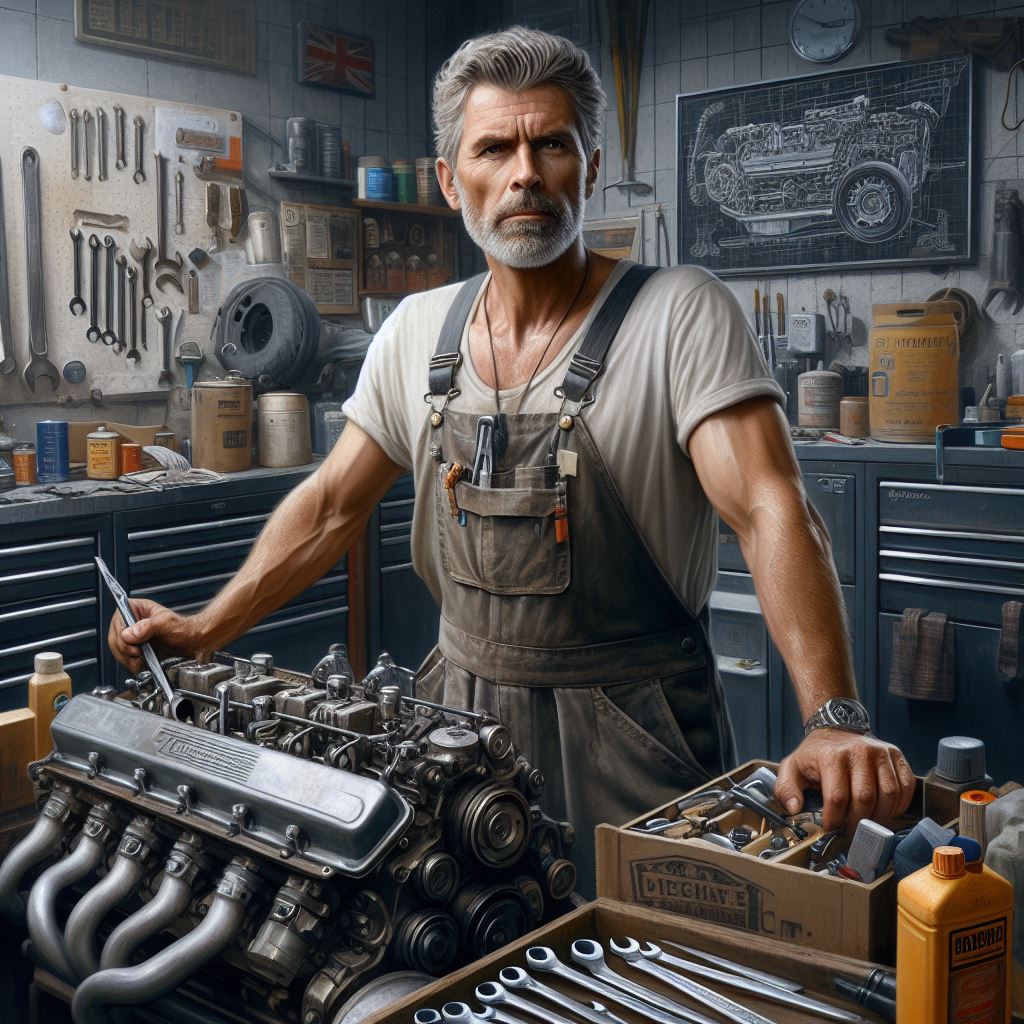Introduction
Mechanic unions in the UK play a crucial role in safeguarding the rights and well-being of mechanics.
Unions, in general, hold immense significance as they advocate for fair wages, safe working conditions, and collective bargaining power.
Unions empower workers to address workplace issues collectively and strengthen their position within the industry.
Embarking on a comprehensive exploration, we delve into the evolution of Mechanic Unions, tracing their origins and pivotal moments that have shaped their identity.
This journey encompasses the socio-economic landscape, legislative influences, and the evolving nature of the automotive industry.
We scrutinize the diverse roles these unions play in safeguarding workers’ rights, negotiating fair wages, and fostering a collaborative environment that transcends individual garage boundaries.
Additionally, we shed light on the challenges and opportunities faced by Mechanic Unions in the contemporary era, considering technological advancements, industry trends, and the ever-changing demands of a skilled workforce.
Join us as we unravel the intricate fabric of Mechanic Unions in the UK, illuminating their significance in the broader context of labor relations and the automotive sector.
History of Mechanic Unions in the UK
The emergence of mechanic unions in the UK
The emergence of mechanic unions in the UK can be traced back to the 19th century.
During the Industrial Revolution, workers faced worsening conditions and sought to protect their rights.
In 1824, the Amalgamated Society of Engineers (ASE) became the first mechanic union to be formed.
The ASE aimed to unite engineers, ironworkers, and other mechanics to improve working conditions.
Throughout the 19th and early 20th centuries, mechanic unions successfully fought for better wages and shorter working hours.
Key milestones and significant events in the history of these unions
One of the key milestones in the history of mechanic unions was the formation of the Trades Union Congress (TUC) in 1868.
The TUC aimed to unite various trade unions, including mechanic unions, to advocate for workers’ rights on a national level.
Personalized UK Career Consulting
Receive tailored career guidance designed just for you. Get actionable steps and expert support to boost your career in 1-3 days. Take control of your career now.
Get StartedAnother significant event was the passing of the Trade Union Act in 1871, which provided legal recognition to unions.
With legal recognition, mechanic unions gained more power to negotiate with employers and secure better working conditions.
The role of mechanic unions in safeguarding the rights and interests of workers in the industry
In the early 20th century, mechanic unions played a crucial role in the fight for the 8-hour working day.
They organized strikes and protests, leading to the implementation of the 8-hour workday in many industries.
During both World Wars, mechanic unions played an essential role in mobilizing workers and supporting the war effort.
They negotiated fair wages and protected workers’ rights in industries crucial to the war effort, such as manufacturing and engineering.
In the post-war period, mechanic unions continued their efforts to improve workers’ conditions through collective bargaining.
They successfully secured benefits such as paid leave, pension schemes, and health and safety regulations.
In recent years, mechanic unions have faced challenges due to changes in the industry, such as automation and outsourcing.
However, they remain committed to protecting the rights and interests of workers in the mechanic industry.
Modern mechanic unions focus on issues such as job security, fair pay, and training opportunities for workers.
They also advocate for sustainable practices and the adoption of new technologies to benefit both workers and the industry as a whole.
Overall, the history of mechanic unions in the UK demonstrates their vital role in safeguarding workers’ rights and improving conditions in the industry.
Read: Essential Soft Skills for UK Mechanics
Your Dream Job Starts with a Perfect CV
Get a tailored CV and cover letter that captures your unique strengths and stands out in your industry. Let us help you make an unforgettable first impression.
Get StartedFunctions and Objectives of Mechanic Unions
Mechanic unions in the UK play a crucial role in advocating for the rights and welfare of their members.
These unions have specific functions and objectives that revolve around ensuring fair wages, working conditions, and benefits.
Additionally, they actively participate in negotiating collective bargaining agreements with employers.
Primary Functions of Mechanic Unions
- Representation: Mechanic unions act as representatives for their members, providing a collective voice in addressing workplace issues.
- Advocacy: They advocate for fair wages, safe working conditions, and improved benefits for mechanics across the UK.
- Collective Bargaining: These unions engage in collective bargaining with employers to negotiate employment terms and conditions on behalf of their members.
- Dispute Resolution: Mechanic unions mediate and resolve conflicts between employers and employees, ensuring a harmonious work environment.
- Legal Support: They offer legal assistance and representation to members who face labor-related issues.
Objectives of Mechanic Unions
- Fair Wages: Mechanic unions strive to secure fair and competitive wages for their members, keeping pace with industry standards.
- Working Conditions: They work towards maintaining safe and healthy working conditions, ensuring the well-being of mechanics.
- Benefits: Mechanic unions advocate for comprehensive benefits packages that include healthcare, retirement plans, and other welfare provisions.
- Training and Development: They promote continuous professional development opportunities for mechanics, fostering skill enhancement and career growth.
- Job Security: Mechanic unions aim to safeguard the job security of their members, protecting against unfair dismissals and layoffs.
Advocacy for Fair Wages, Working Conditions, and Benefits
Mechanic unions in the UK are committed to advocating for fair wages that reflect the skills, experience, and contributions of mechanics.
Through negotiations and collective action, they strive to ensure that their members receive equitable compensation.
Additionally, these unions actively focus on improving working conditions, knowing that a safe and conducive environment enhances job satisfaction and performance.
They push for compliance with health and safety regulations, making certain that mechanics are not subjected to hazardous or exploitative conditions.
Benefits are another area of emphasis for mechanic unions.
They recognize the importance of comprehensive benefit packages, including healthcare and retirement plans, as essential components of a sustainable work-life balance.
By championing these benefits, unions contribute to the overall well-being of their members.
Role of Mechanic Unions in Negotiating Collective Bargaining Agreements
Mechanic unions are pivotal in negotiating collective bargaining agreements (CBAs) with employers.
CBAs establish the terms and conditions of employment for mechanics and provide a mechanism for addressing any potential labor disputes.
Through collective bargaining, unions secure various provisions in CBAs, including fair wages, benefits, working hours, and grievance procedures.
Mechanic unions employ their bargaining power to ensure that the needs and interests of their members are well-represented and protected.
Optimize Your LinkedIn for Success
Boost your LinkedIn profile with a professional bio, keyword-rich headline, and strategic recommendations that attract recruiters. Stand out from the crowd and get noticed.
Optimize NowBy engaging in negotiations and maintaining healthy relationships with employers, mechanic unions establish a platform for constructive dialogue and collaborative decision-making.
This ultimately leads to improved working conditions and fair treatment for mechanics across the UK.
In summary, mechanic unions in the UK serve essential functions and work towards achieving specific objectives.
They advocate for fair wages, improved working conditions, and comprehensive benefits for their members.
Moreover, these unions play a critical role in negotiating collective bargaining agreements, paving the way for harmonious employer-employee relationships.
Read: How to Start a Welding Business in the UK
Membership and Representation
An overview of the mechanics who can join unions in the UK
In the UK, mechanics from various sectors can join unions to protect their rights.
Joining a mechanic union provides representation and support during workplace disputes.
Specific requirements or qualifications for becoming a union member
There are no specific requirements or qualifications for becoming a mechanics union member.
Mechanics can join unions regardless of their level of experience or education.
Benefits of joining a mechanic union in terms of representation and support
Union membership allows mechanics to collectively bargain for better working conditions.
By joining a union, mechanics gain a stronger voice and influence over employment policies.
Unions offer legal advice and support to members facing issues with their employers.
Joining a union provides mechanics with access to training and development opportunities.
Unions negotiate fair pay and benefits for their members, ensuring a decent standard of living.
Unionized mechanics can participate in shaping industry regulations and policies.
By being a part of a mechanic union, members have the collective power to make positive changes in their workplace and industry.
Read: Women in Welding: UK Industry Insights

Successes and Challenges of Mechanic Unions in the UK
In the UK, mechanic unions have been instrumental in advocating for the rights and welfare of mechanics across the country.
They have achieved notable successes through their collective action and negotiation with employers.
Successes Achieved by Mechanic Unions
- Improved Working Conditions: Mechanic unions have successfully advocated for safer working conditions, including the implementation of safety protocols and proper training programs.
- Fair Wages: Through negotiations and strikes, mechanic unions have secured fair wages for their members, ensuring that their labor is adequately compensated.
- Reduction in Working Hours: Mechanic unions have fought for a reduction in excessive working hours, aiming to prevent exhaustion and maintain a good work-life balance.
- Healthcare Benefits: These unions have played a crucial role in ensuring access to healthcare benefits for their members, thus improving their overall well-being.
- Professional Development: Mechanic unions have promoted ongoing training and professional development opportunities, enhancing the skills and knowledge of their members.
Challenges faced by Mechanic Unions and their Solutions
- Anti-Union Legislation: Mechanic unions have faced restrictions and anti-union legislation that limit their ability to organize and negotiate effectively. They have overcome this by lobbying for legislative changes and forming strong alliances with other unions.
- Resistance from Employers: Some employers have been resistant to unionization efforts, leading to obstacles in the formation and growth of mechanic unions. Persistence and solidarity among members have helped overcome this challenge.
- Technological Advancements: The rapid advancement of technology in the automotive industry has led to concerns about job security. Mechanic unions have adapted by advocating for retraining programs and job guarantees.
- Shift towards Electric Vehicles: The transition towards electric vehicles poses a challenge for mechanic unions, as it requires specialized skills and knowledge. These unions are addressing this by partnering with vocational schools and industry experts.
- Workplace Diversity and Inclusion: Mechanic unions are working towards ensuring fair representation and inclusion of underrepresented groups, such as women and minority mechanics, to create a more diverse and equitable industry.
Ongoing Issues and Struggles in the Current Socio-economic Climate
- Precarious Work: The rise of gig economy and temporary contracts have led to increased insecurity for mechanics. Mechanic unions are advocating for fair employment contracts and job stability.
- Socio-economic Inequality: Mechanic unions are grappling with addressing socio-economic disparities within the profession, fighting for fair opportunities and wages for all mechanics.
- Automation and Artificial Intelligence: The potential impact of automation and AI on the mechanic industry raises concerns about job displacement. Unions are working towards re-skilling and upskilling programs to ensure members stay relevant in the changing landscape.
- Climate Change and Sustainability: Mechanic unions recognize the need to adapt to the growing demand for sustainable transportation. They are pushing for training programs on electric and hybrid vehicles and encouraging eco-friendly practices in the industry.
- Union Membership Decline: Mechanic unions face the challenge of declining membership due to changes in the nature of work and shifting attitudes towards unionization. To counter this, they are increasing outreach efforts and highlighting the value of union membership.
In general, mechanic unions in the UK have achieved remarkable successes in advocating for their members’ rights and welfare.
However, they continue to face challenges in the form of legislative restrictions, technological advancements, and changing industry dynamics.
Through adaptability, solidarity, and proactive measures, these unions strive to overcome these challenges and ensure a fair and prosperous future for mechanics in the UK.
Read: Welder Health: Avoiding Hazards in the UK
Impact of Mechanic Unions on the Industry and Workers
In the automotive industry in the UK, mechanic unions have had a significant impact.
They have brought about positive changes, improving both working conditions and the livelihoods of mechanics.
1. Improved Working Conditions
- Mechanic unions have played a crucial role in advocating for better working conditions.
- They have fought for safer workplaces, ensuring that mechanics are not exposed to unnecessary risks.
- Through collective bargaining, unions have secured agreements that address issues such as hours of work and rest breaks.
- These improvements have led to a healthier and more productive workforce.
2. Higher Wages and Benefits
- Mechanic unions have successfully pushed for higher wages for their members.
- They have negotiated fair pay scales, ensuring that mechanics receive a decent income for their skills and expertise.
- Additionally, unions have fought for improved benefits, such as healthcare coverage and retirement plans.
- These enhancements have helped uplift the overall financial well-being of mechanics.
3. Influence on Industry Regulations and Policies
- Mechanic unions have had a significant influence on industry regulations and policies.
- They have actively participated in discussions and negotiations with government bodies and industry stakeholders.
- By advocating for their members’ interests, unions have shaped regulations related to workplace safety, environmental standards, and certification requirements.
- Their involvement ensures that the automotive industry operates in compliance with ethical and legal standards.
In a nutshell, mechanic unions in the UK have played a vital role in improving both the industry and the lives of workers.
Through their efforts, they have secured better working conditions, higher wages, and improved benefits for mechanics.
Moreover, their influence on industry regulations and policies has ensured a more ethical and responsible automotive sector.
Mechanic unions continue to be crucial in safeguarding the rights and well-being of workers in the industry.
Conclusion
Mechanic unions in the UK play a crucial role in safeguarding the rights and interests of mechanics.
They have proven to be of great importance throughout history, promoting fair wages, safe working conditions, and job security.
These unions have continuously fought for the rights of mechanics, ensuring they are not exploited by employers and that their well-being is prioritized.
The ongoing role of mechanic unions in the UK is vital in maintaining a balanced and fair working environment for these skilled professionals.
As we move forward, it is imperative to acknowledge the significance of mechanic unions and their relentless efforts to protect the rights of workers.
By joining forces and being part of a collective voice, mechanics are empowered to demand fair treatment and better working conditions.
Moreover, in an ever-changing landscape, mechanic unions must adapt to new challenges and advocate for advancements in the industry.
By staying aware of emerging issues, such as technology advancements and sustainable practices, mechanic unions can ensure that the rights and interests of mechanics are continually protected.
To truly understand the importance of mechanic unions and the role they play, it is crucial for both mechanics and the general public to engage in discussions, debates, and action.
Through continued conversation and involvement, we can work towards creating an industry that values and respects the contribution of mechanics, ultimately benefiting not only the individual workers but the entire society.
So, let us continue to support mechanic unions and foster an environment that recognizes their significance, as their work reverberates far beyond the workshop floor, shaping the future of the automotive industry and securing a fairer tomorrow.
[E-Book for Sale]
500 Cutting-Edge Tech Startup Ideas for 2024 & 2025: Innovate, Create, Dominate
$19.99 • 500 Tech Startup Ideas • 62 pages
You will get inspired with 500 innovative tech startup ideas for 2024 and 2025, complete with concise descriptions to help you kickstart your entrepreneurial journey in AI, Blockchain, IoT, Fintech, and AR/VR.




